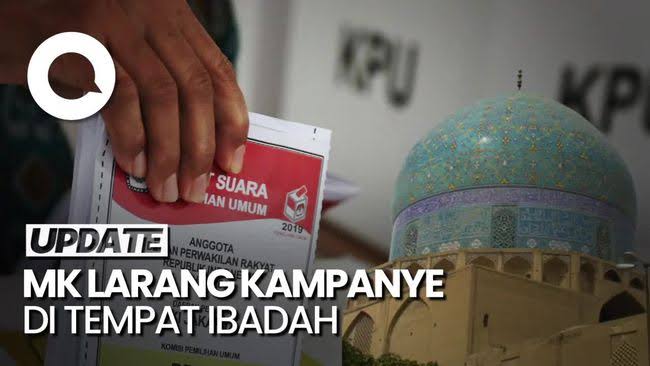Appreciate the Constitutional Court’s Decision to Ban Campaigning in Places of Worship
Very high appreciation should be given to the official decision made by the Constitutional Court (MK) in banning campaign activities in places of worship. This is the same as trying to maintain the sanctity and sacredness of places of worship so that they are not mixed with practical political activities that actually have the potential to create polarization in society with the issue of identity politics .
One of the activities that are usually carried out by those who advance to political contestation is of course campaigning. This is intended so that parties or figures who advance to contest the General Election (Pemilu) are able to become more widely known by the public so that they gain a lot of votes.
However, of course, when conducting your own campaign, you should not be careless and there are several rules that absolutely should not be violated. Starting from when to carry out the campaign, to where to carry out the campaign activities.
All of them must be observed more closely by those who are running for election political contestation in Indonesia so that they do not violate existing regulations and in fact do not tarnish the good name of the implementation of the principles of democracy in the country itself. The reason is that if several violations are still being committed, it will clearly tarnish the good name of democracy in Indonesia.
Therefore, the Constitutional Court (MK) then very firmly banned places of worship used for campaigning. The MK’s ban is also in accordance with a previous request put forward by a member of the Regional People’s Legislative Council (DPRD) for the Special Capital Region (DKI) of Jakarta, Yenny Ong.
Previously there was indeed a lawsuit from the person concerned regarding Article 280 paragraph 1 letter h in the Election Law, which reads: “Election campaigners, participants and teams are prohibited from using government facilities, places of worship, and places of education. ”
However, the explanation reads: “Government facilities, places of worship, and places of education can be used if election participants attend without election campaign attributes at the invitation of the person in charge of government facilities, places of worship, and places of education.”
Of course, the Constitutional Court granted this request by strictly prohibiting campaign activities in places of worship . The Chief Justice of the Constitutional Court, Anwar Usman, revealed that he had partially granted the request for the lawsuit.
In its grant , the Constitutional Court removed the Explanation of Article 280 paragraph 1 letter h of the Election Law. Then for Article 280 paragraph 1 letter h the Election Law itself was revised, in which the Constitutional Court stated that in Article 280 paragraph 1 letter h the Election Law was made into: “Executors, participants and election campaign teams are prohibited from using government facilities , places of worship , and education, except for government facilities and educational places as long as they get permission from the person in charge of the said place and attend without the attributes of an election campaign.”
It is not without reason why in the end the Constitutional Court granted the request and is now very firmly banning campaign activities in places of worship. The reason is, of course it is considered that using a place of worship as a venue for campaigning will have the potential to cause emotion and controversy and can also damage religious values.
Moreover, considering the condition of the people in Indonesia who can be said to be quite easy to be provoked and react quickly to various issues related to identity politics, including religious issues which are quite sensitive for the people themselves.
There is one thing that is important to understand in this context, that restrictions on the use of places of worship for campaign activities certainly do not necessarily mean that the Constitutional Court separates religion from state institutions, but rather how the process of differentiating functions between religious institutions and non-religious domains. in society, especially for issues that are really related to politics, practice is very high.
Meanwhile, Chairman of the Central Leadership Council of the Indonesian Unity Party (DPP Perindo ) for Religious Affairs , Abdul Khaliq Ahmad, gave a very high appreciation of how the Constitutional Court’s decision regarding the ban on campaigning in places of worship.
According to him, that the existence of this decision from the Constitutional Court is a form of respect for places of worship so that they can continue to remain neutral from all activities related to practical politics in society, so that purely places of worship are only used for activities related to religion. This is because the places of worship themselves must continue to maintain their sanctity and neutrality from various practical political activities that have the potential to cause polarization and undermine social harmony.
For this reason, now that the Constitutional Court’s decision has been passed which has officially banned campaigning activities in places of worship, then this deserves to be given a very high appreciation because it is the same as continuing to strive to maintain the sanctity and dignity of the place of worship itself so that it is not mixed with practical political affairs.
